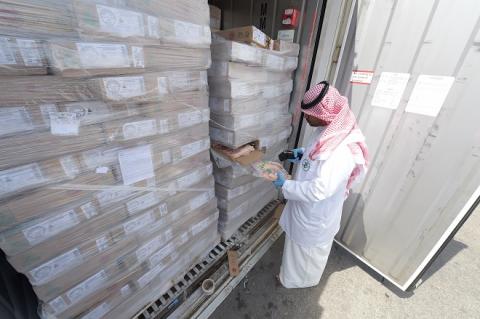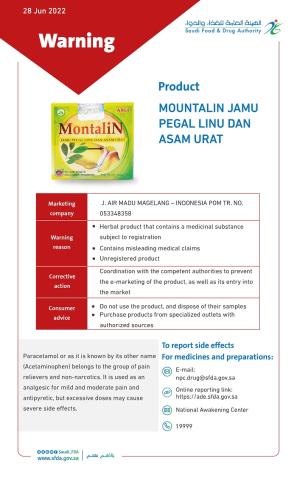SFDA prevented the entry of more than 10.6 million kilograms of food for violation through crossings borders during the first six months of this year.
SFDA explained, that the prevent of entry of those imported food to Kingdom was for violating the technical regulations and standards approved by the chemical or microbial or physical or mandatory explanatory card data on the products or ban of importing.
The total weight of the rejected consignments during the month of Muharram was 1218 tons, while the total weight of the rejected consignments during the month of Safar was 3770 tons, and in Rabie I 1548 tons, Rabie II of 1657 tons, and in Jumada I 1163 tons, and in Jumada II 1254 tons.
And It turns out that about half of the rejected consignments was rice and vegetables and processed fruits, meat and grain weight, and the products was carrying food microbial irregularities was 1,388,709 kg weight, and the one carrying food and chemical irregularities 1,259,677 kilograms, while the ones with physical irregularities 1,783,732 kilograms, and irregularities labels 6,127,158 kilograms, and violations of the banned substances (meat and poultry products and milk and pasta) 53,447 kg.
In terms of food types which has rejected the rice was on top of the list 1,504,750 kilograms, then vegetables and processed fruits (prepared or preserved) 1,317,962 kilograms, then meat and poultry 1,179,567 kilograms, Full Grains 930,527 kilograms, then coffee and tea 929,387 kilograms, Fish & sea food 835,676 kg, then pasta 633,091 kilograms, 606,224 kilograms of sugar, milk products 600,031 kilograms, extracts and concentrates of coffee or tea 409,564 kilograms, cortical fruits 391,798 kilograms, beverages 382,122 kilograms, oils and fats 244,283 kg, sugar products containing cocoa 156,793 kg, wheat flour (wheat) 146,474 kilograms, food preparations for meat 90,902 kilograms, 84,195 kg of salt, vegetable juices and extracts 49,438 kilograms, Food Industry 33,875 kilograms, modified starch 18,000 kg, in addition to 20,950 kg of other food stuffs.
SFDA HE Chief Executive, Dr. Mohammed bin Abdulrahman Al Meshaal, pointed that the development of SFDA procedures greatly affected and increased in the effectiveness of controlling on imported food in borders.
He pointed out that electronic clearance system, which began work there in 1435 in all outlets enhanced control and eased procedures, as they are no cleance for any consignment only through the electronic systems, which is makes it easier to obtain information on products, importers, and to quickly follow with the event of a call or problems concerning consumers safety, adding that the electronic system of (Black Listing) which was launched in 1435 plays an important role in tightening controls on imported food also.
He stated that the developmental actions in SFDA food system recently was consent by the Council of Ministers, which authorizes SFDA to issue technical regulations for food standard and specifications, and to agree on imported food according to the conditions, requirements and procedures approved by SFDA.
SFDA inspectors audited the certificates and documents accompanying the (imported food) and ensure completeness of (documentary review) and matching all items contained in the consignment with the documents (making sure of product) identity, and the characters to the consignment containers and a physical examination to ensure conformity of food items to technical regulations and standards, and the presence of all the explanatory statements required by technical regulations and standards on all varieties representing the consignment, in addition to items that need to be inspected in the laboratory for analysis.
Consignment can be rejected if it's not allowed to enter the Kingdom market at any stage of the inspection, as is the permission is granted for varieties that do not have any observations on the same day to customs procedures to end the clearance.




